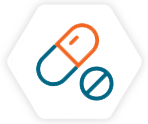Kidney & Liver Health
The liver and the kidneys are some of the most essential and hardworking organs in the body. They carry out numerous functions such as excretion of waste, metabolism of many substances, hormonal regulation, and proper digestion, as well as proper coagulation.

Comprehensive Metabolic Panel
This panel includes the 14 tests included in the Comprehensive Metabolic Panel (CMP) and are required by a physician for annual check-up and physicals. This panel gives you and your doctor a clear picture of your overall health.
Creatine Test
Creatinine occurs naturally in muscle tissue. It helps produce the energy needed for heavy lifting, high-intensity exercise, and other high energy pursuits.
- In healthy individuals, the daily level of creatinine in the blood remains stable.
- The kidneys metabolize and excrete creatinine.
- Some people take creatinine supplements to build and maintain muscle mass. Too much creatinine in the blood, however, can cause liver, kidney, and heart problems.
Hepatic Function Panel
The Hepatic Function Test checks for chemicals in the blood that reveal liver function. Higher or lower levels of the substances may indicate illness, disease, or declining function.
Urinalysis Routine
The Urinalysis test reveals the presence of several health problems. Optimally, it detects normal kidney and metabolic function. Urine also carries evidence of illness or disease.
This is part of a routine check up.
Urine Culture
Urinary Tract Infection (UTI) are common and can affect the kidneys, bladder, ureters and urethra. The urine culture identifies the organism causing an infection so that an appropriate antibiotic can be prescribed by your doctor.
Uric Acid
The Uric Acid Test measures the level of uric acid in the blood. High Levels of Uric Acid are an indicator of gout and ultimately lead to kidney stones and or kidney failure.